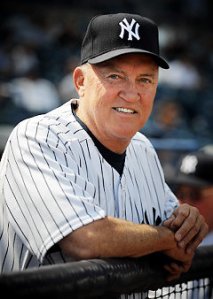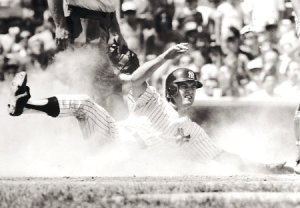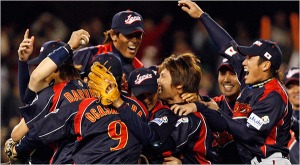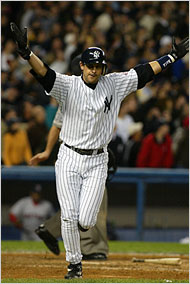Eri Yoshida age 17, is a side-arm knuckleballer, who is also the first female professional baseball player in Japan.It's an indie league that's far, far away from the NPB, so we probably shouldn't get too excited, but it's a kind of pro-ball league all the same.
This is her throwing out a ceremonial first pitch.
Here's a news story on her.
In the second video, Emoto, a critic says that if she doesn't have a fastball to go with it, she won't be able to get her knuckle to be effective. Well... the next video is where things get more interesting
Atsuya Furuta, one of the great catchers in the NPB history, who played in the 1999 Intercontinental Baseball Cup against Australia takes on the 17 year old Eri Yoshida and her knuckleball in this video.
In that video, you'll see her fast ball is a gyroball.
Yes, you read that right, the mythical gyroball happens to be Eri Yoshida's fast ball! (so eat your heart out Dice K!). The ball spirals on the axis heading towards the plate. You see it in super slow motion.
Then, the knuckleball demonstration in super slow motion shows that the ball heads towards the plate with virtually no spin. Atsuya Furuta who catches it says, "It really moves quite a bit". This observation then turns into Furuta stepping into face Yoshida and her arsenal, only to end up striking out swinging on a full count.
Furuta explains that even if the last pitch looked high, he thought if he could hit it before it came down, he would be hitting it before it moved. He swings wildly over the knuckleball - He couldn't even tell if the ball went over or under the bat. In fact, he didn't even foul off a pitch in the 6 pitch sequence.
This video is the news story on Yoshida getting her first strike out having walked her first batter. Walking a batter on 4 pitches isn't great, but the strike out is worthy. So worthy it traveled the wire to ESPN.
OSAKA, Japan -- Japan's first female professional baseball player made her debut Friday, striking out one batter in the ninth inning.
Eri Yoshida, a 17-year-old who throws a sidearm knuckleball, took the mound during Kobe 9 Cruise's 5-0 season-opening win over the Osaka Gold Villicanes in the newly formed Kansai Independent League.
The 5-foot, 114-pounder walked the first batter leading off the inning on four pitches and allowed a stolen base before striking out the next batter swinging at Osaka Dome. She was then replaced after facing two batters.
"I wasn't thinking about anything other than just going out there and giving it my all," said Yoshida, who is hoping to stick with the Kobe team. "I think this was a bad result but the stadium is great and the fans were really cheering me on. I want to be able to pitch more innings and become a pitcher who can be relied upon."
Which is great. And so Rob Neyer chimes in with this rather uncharitable commentary:
Hmmm, let's see … five feet and 114 pounds … what happens when the enemy hitters start dropping bunts into that tricky area between the pitcher's mound and the third-base line? Will Yoshida have the quickness and the arm strength to throw anyone out at first base? And speaking of arm strength, what happens when the count is three balls and no strikes? Or what happens when there's a grounder to the first baseman and she has to cover first base and gets run over by some burly first baseman?
A publicity stunt? Why would anyone think that?
David Pinto writes, "I've thought for a while that the path for women to professional baseball would be through the knuckleball. Glad to see that happened in Japan."
Well, yeah; it might be. You have to admire her dream and her persistence and her skills (or skill). But you can't play if you don't have the requisite physical tools, too.
I like Neyer, but his comment is clearly under-researched. She has a gyroball to go with her knuckleball, she throws sidearm; heaven knows if she has or hasn't another pitch, but it's not out of the question to learn another one - she's still only 17! I think the team that drafted her might have seen it as a stunt, but at the same time it's clear she's got technique. She's got game.
The resulting brouhaha on BTF is fascinating too. I don't know just how far she can go, but then again she's only 17. It may yet start a trend of Japanese grils throwing the knucler, the gyroball, sidearm and deceptive. Maybe some of them might just get the NPB. Maybe some of them might even crack the MLB. Maybe the possibilities for baseball skipping over the gender barrier has just opened up?

 Nettles had surgery to remove his prostate in April of last year.
Nettles had surgery to remove his prostate in April of last year. "I'm indebted to the Yankees for always inviting me out to spring training," says Nettles, who came to Yanks in trade with Cleveland in 1972. "I know I can't do the things I used to anymore, so I live through the players. It's all in memory what I did."
"I'm indebted to the Yankees for always inviting me out to spring training," says Nettles, who came to Yanks in trade with Cleveland in 1972. "I know I can't do the things I used to anymore, so I live through the players. It's all in memory what I did." Seattle Mariners star Ichiro Suzuki hit a two-out, two-run single in the top of the 10th, and Japan beat reigning Olympic champion South Korea 5-3 Monday night to win its second straight WBC title before a boisterous crowd of 54,846 at Dodger Stadium.
Seattle Mariners star Ichiro Suzuki hit a two-out, two-run single in the top of the 10th, and Japan beat reigning Olympic champion South Korea 5-3 Monday night to win its second straight WBC title before a boisterous crowd of 54,846 at Dodger Stadium.

 Boone, 36, has known about his heart condition since the early 1990s, when he played for the University of Southern California. A recent physical and follow-up exam revealed that he needs an operation soon, and Boone will schedule it in the coming days.
Boone, 36, has known about his heart condition since the early 1990s, when he played for the University of Southern California. A recent physical and follow-up exam revealed that he needs an operation soon, and Boone will schedule it in the coming days. The night before his life changes forever, Alex Rodriguez calls from Miami with an urgent request. A-Rod is worried about something he said during our interview last night. I've been hearing mysterious warnings all afternoon: Alex needs to talk. Alex wants to clarify something. Can't say what. Alex will call you from his car.
The night before his life changes forever, Alex Rodriguez calls from Miami with an urgent request. A-Rod is worried about something he said during our interview last night. I've been hearing mysterious warnings all afternoon: Alex needs to talk. Alex wants to clarify something. Can't say what. Alex will call you from his car. The 40-year-old actress - who recently expressed an interest in appearing in the British spy film franchise - is set to be offered a screen test for the follow up to Quantum of Solace which will star Daniel Craig as James Bond.
The 40-year-old actress - who recently expressed an interest in appearing in the British spy film franchise - is set to be offered a screen test for the follow up to Quantum of Solace which will star Daniel Craig as James Bond.